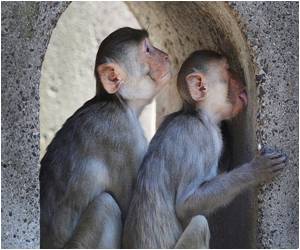
But this study was one of the first to show that primates form preferential bonds between relations of the same sex before they have even left the group.
Researchers found that young monkeys had an equal opportunity to mingle and interact with either parent when growing up. As they were developing, infant monkeys of both sex spent most of their social time with their mothers and her relatives. That wasn’t surprising, as mothers tend to spend most time with their young after weaning, so the juveniles become more familiar with her and her relatives.
Young female monkeys formed particularly strong bonds with their female relatives.
But at the point of maturation, when infant monkeys develop into young adult monkeys, males very much became their fathers’ sons; preferring to spend time with their fathers and his relatives.
It was still not clear exactly why the young male monkeys do this; one idea is that it helps prepare the young males for later life. Or it might allow them to form bonds with other male monkeys who will leave the group at a similar time. By becoming friendly, these males might be useful to one another as they try to establish themselves elsewhere.
Advertisement
Source-ANI









